
题目列表(包括答案和解析)
长对话理解(本题共
10分,每小题1分)听下面四段长对话。从各题所给的选项中选出一个最佳选项。
听第
1段对话,回答下题。1.What does the man want to buy?
A.Shoes.
B.Shirt.
C.Skirt.
2.What size does the man want?
A.40.
B.39.
C.49.
听第2段对话,回答下题。
3.How many rooms are there in the house?
A.3.
B.4.
C.5.
4.Who are the man and the woman?
A.Two friends.
B.Husband and wife.
C.Brother and sister.
听第3段对话。回答下题。
5.What's the man looking for?
A.A bag.
B.An English book.
C.A radio.
6.When did the man lose it?
A.In the afternoon.
B.In the morning.
C.In the evening.
7.Where is this conversation taking place?
A.In the street.
B.In the hospital.
C.In the hotel.
听第4段对话,回答下题。
8.What are the two speakers talking about?
A.Traveling.
B.Doing housework.
C.A plan for holiday.
9.How long will it last?
A.Several days.
B.Two weeks.
C.Two months.
10.Why does the boy want to go to a summer school?
A.To improve his English.
B.To make some new friends.
C.It might be interesting.
听选信息(本题共5分,每小题1分)
听下面一段对话,对话后有5个小题。从各题所给的选项中选出一个正确的选项。

短文理解(本题共
5分,每小题1分)听下面一篇短文,短文后有
5个小题。从各题所给的选项中选出一个最佳选项。16.What was wrong with the clock?
A.It went very slowly.
B.It went very quickly.
C.It stopped working at night.
17.When did the speaker wake up in the morning?
A.At 9∶00.
B.At 10∶00.
C.At 10∶30.
18.What did the speaker do after he got up?
A.He ran to the bus stop after breakfast.
B.He ran to the bus stop without breakfast.
C.He ran to the bus stop with breakfast.
19.What happened to the first bus?
A.It got to his school very fast.
B.There was something wrong with it half way.
C.It went slowly.
20.What was the worst thing for the speaker?
A.He forgot to take his schoolbag.
B.He missed all his classes.
C.He lost his schoolbag.
| 幼时 | | |
| 初中 | “我”认为父亲是想白吃人家养的鱼儿去敲蔡婆家的门 | “我”不理解父亲 |
| 大学毕业 | | |
| A.文中有两条线索,明线是人与人之间真挚温暖的情谊,暗线是“敲门”“送鱼”。一明一暗两条线索串连起前后两个故事。 |
| B.文中共写了父亲两次“笑”。第一次,面对“我”的误解与责问,父亲的“笑”表明了他的宽厚大度。第二次,面对“我”的赞美,老实的父亲表现出了纯朴、实在、厚道。 |
| C.文中插叙了爷爷的故事,交代了父亲之所以常去敲蔡婆的门的原因,回应了上文“我”的一连串疑问与不解,使文章更吸引人。 |
| D.结尾用了议论和抒情的表达方式,点明了主旨,给读者以启迪。 |
听力测试
(一)听句子,选择与画面一致的选项。每个句子听一遍:
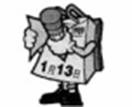

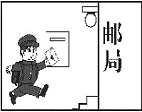
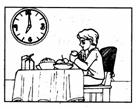
1. ( A B C ) 2. ( A B C ) 3. ( A B C ) 4. ( A B C )
(二)、请听句子,选出恰当的答语。每个句子听一遍:
( )5. A. It’s Sunday. B. It’ April 21. C. It’s half past eleven.
( )6. A. It’s very hot. B. It’s very heavy. C. It’s very large.
( )7. A. Yes, please. B. You are welcome. C. Sorry, I can’t.
( )8. A. No, it isn’t. B. Yes, it is. C. Thank you.
( )9. A. About 40 minutes.
B. About half an hour’s walk.
C. About 5 meters long.
( )10. A. I think it is interesting.
B. I like a story.
C. I’m reading.
(三)听对话,宣战正确答案。每组对话听两遍。
( )11. When was Edison born?
A. In 1874. B. In 1931. C. In 1847.
( )12. Why wasn’t the boy at school yesterday?
A. He had to look after his mother.
B. He had to look after his father.
C. He was ill in bed.
( )13. What’s the woman’s telephone number?
A. 3897244. B. 3879224. C. 3789244.
( )14. Why was the girl late again for school?
A. She was ill. B. She got up late. C. She met a traffic accident.
( )15. When does the dialogue happen?
A. During class. B. After class. C. Before class.
( )16. What does the girl’s mother do?
A. A nurse. B. A doctor. C. A worker.
( )17. What size does the man wear?
A. The large size. B. The small size. C. The medium size.
(四)对话理解: 对话听两遍:
听第一段对话,回答第18-21小题。
( )18. What’s wrong with the boy?
A. He’s got a headache. B. He’s got a high temperature.
C. He’s got a cold.
( )19. How long has he been like this?
A. For one day. B. For two days. C. For three days.
( )20. Is he seriously ill?
A. Yes, he is. B. Yes. But he will be well soon. C. No, he isn’t.
( )21. How many times should he take the medicine a day?
A. One time. B. Two times. C. Three times.
听第二段对话,回答第22-25小题。对话听两遍:
( )22. Where does the man want to go?
A. London. B. Hong Kong. C. America.
( )23. When will he go there?
A. June 29th. B. June 30th. C. July 1st.
( )24. When will the earliest flight leave?
A. At 7:00 in the evening. B. At 8:00 in the morning.
C. At 7:00 in the morning.
( )25. Does it stop in Beijing?
A. Yes, it does. B. No, it doesn’t. C. We don’t know.
(五)听短文回答问题,短文听两遍。
( )26. Where did Mr. White work?
A. France. B. America. C. England.
( )27. Why was Mrs. White angry?
A. Her husband wouldn’t go to see their son.
B. Her husband was hit by a car.
C. Her husband didn’t love her.
( )28. How did Mr. and Mrs. White go to Paris?
A. By ship. B. By train. C. By plane.
( )29. Mr. White didn’t know how they had got to Paris because _____ on their way.
A. he was asleep
B. he was thinking about his work
C. he was worried about his son
( )30. From this passage we know_____.
A. Mr. White loved nobody except himself
B. Mr. White couldn’t get on well with anybody
C. Mr. White was always interested in his work
听力测试
(一)听句子,选择与画面一致的选项。每个句子听一遍。

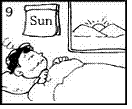
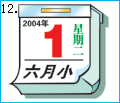

1. ( A B C ) 2. ( A B C ) 3. ( A B C ) 4. ( A B C )
(二)请听句子,选出恰当的答语。每个句子听一遍。
( )5. A. It’s my pleasure. B. I’m sorry to hear that. C. Never mind.
( )6. A. I’m not sure. B. Yes, please. C. That’s too much.
( )7. A. Nice to meet you. B. See you later. C. What a good idea!
( )8. A. Yes, I agree with you. B. Certainly, This way, please
C. Yes, it’s very nice of you.
( )9. A. What are you going to do?
B. I think so. Why?
C. Oh, what shall I do?
( )10. A. It’s cheaper than yours. B. Fifty yuan. C. It’s expensive.
(三)对话问答:选择正确答案对话听两遍。
( )11. Who is going to visit her friends this afternoon?
A. Betty. B. Betty’s sister. C. Bob’s sister.
( )12. Why did the girl get up so early?
A.To catch the early bus.
B. To prepare for an English exam.
C. To prepare for a math’s exam.
( )13. Where was the man last Sunday?
A. He was with his friend.
B. He took a walk with his friend.
C. He went shopping with his friend.
( )14. Where does the dialogue take place?
A. In a classroom. B. In a store. C. In a computer room.
( )15. What’s the woman?
A. A shop assistant. B. A librarian. C. A customer.
( )16. When does the dialogue probably happen?
A. In the morning. B. In the evening C. At 7:45 a.m.
( )17. What place is the woman looking for?
A. A hotel. B. A cinema. C. A hospital.
(四)对话理解:
听第一段对话,回答第18-21小题。对话听两遍。
( )18. What are they talking about?
A. The moon. B. Animals. C. Plants.
( )19. How far is the moon away from the earth?
A. Three hundred metres.
B. Three hundred and eighty thousand kilometres.
C. It’s not very far
( )20. Why can nothing live on the moon?
A. People don’t like to live there. B. There’ no air or water.
C. There’s no light.
( )21. What’s the weather like tonight?
A. Cloudy. B. Rainy. C. Clear.
听第二段对话,回答第22-25小题。对话听两遍。
( )22. Where are they talking?
A. At home. B. At the cinema. C. At a shop.
( )23. How much rice did the man buy?
A. One bag. B. Two bags. C. One bottle.
( )24. How many kinds of things did the man buy?
A. Four. B. Five. C. Three .
( )25. How much did all the things cost?
A. $13. B. £300. C. $30.
(五)听短文回答问题,短文听两遍。
( )26. Where was the telephone?
A. It’s in London’s school. B. It’s in her office. C. It’s in her home.
( )27. Who made the first telephone call?
A. A man. B. Linda’s father. C. Linda’s mother.
( )28. How many telephone calls did the man make in the story?
A. One. B. Two. C. Four
( )29. Who made telephone call three minutes later?
A. The man. B. Linda’s father. C. Linda’s mother.
( )30. How many persons are there in the story?
A. Two. B. Three. C. Four.
| A.外婆家后园的花红柳绿、虫鸣燕舞给儿时的“我”留下深深的印象,为“我”成年后的养花之渴望做了铺垫。 |
| B.作者认为,自己在很长一个人生阶段只长年岁不长心眼,是因为自己连养花种草都做不好。 |
| C.第⑥段叙述黄岳渊先生辞官种花之事,多用四字句和文言词语,既使文章语言凝练典雅,也可借此暗示黄岳渊先生的高雅。 |
| D.文章先从自己种花草的经历谈起,再对照黄岳渊种花草的故事,顿悟出人的一生只能做一件事的道理,由事入理,说理既深刻又形象。 |
湖北省互联网违法和不良信息举报平台 | 网上有害信息举报专区 | 电信诈骗举报专区 | 涉历史虚无主义有害信息举报专区 | 涉企侵权举报专区
违法和不良信息举报电话:027-86699610 举报邮箱:58377363@163.com